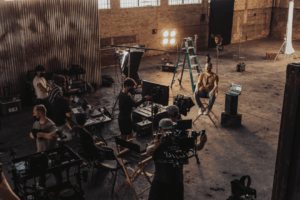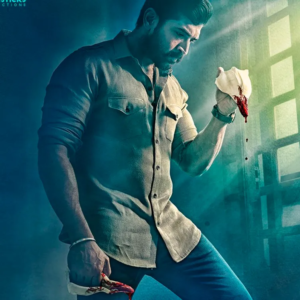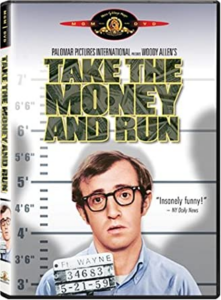A first assistant director, 1st AD, or simply assistant director, manages the logistics of creating a film or a television series. These professionals oversee production heads and serve as a point of contact between the director and the rest of a production’s cast and crew. The first assistant director may be the only assistant director working on a production, or they could manage a team of assistant directors.
An assistant director is not the same as a director’s assistant. A director’s assistant usually has an administrative role during production. In contrast, an assistant director’s role is much more hands-on.
2nd AD
Many productions also have a second assistant director, sometimes called a 2nd AD. This assistant director works underneath the 1st AD. They may complete tasks with the 1st AD or have their own tasks delegated. A 2nd AD is more likely to be the contact point for stand-ins and extras. A 1st AD, in contrast, is more likely to be the contact point for a production’s stars.
Some large productions may have several other assistant directors working under the 2nd AD, including:
- Second second assistant director (2nd 2nd AD)
- Third assistant director (3rd AD)
- Additional assistant director (sometimes called the fourth assistant director or 4th AD)
What Does an Assistant Director Do?
An assistant director ensures that all members of the production know their schedules and that shooting occurs on time. This work starts during pre-production and continues through to post-production. Their scheduling and organizational efforts make a director’s job easier. Take a closer look at some of the most common tasks an assistant director does:
Perform Script Breakdowns
Assistant directors break down the script to determine the essential elements for every scene. These elements include:
- Characters and extras, including animal actors
- Props and set dressing
- Costumes and makeup
- Stunts
- Special effects
- Sounds and music
Create Storyboards and Shot Lists
Assistant directors refer to their script breakdown to create storyboards and shot lists. They work closely with the director and director of photography on this task. As the name suggests, a shot list is a list of all the shots required for the production. A storyboard is a visual representation of a shot list. Storyboards and shot lists help the crew understand the director’s vision.
Schedule the Shoot
The assistant director creates a shooting schedule based on the script breakdown. This schedule considers the availability of shooting locations and actors. The schedule also notes the costumes, props, and set dressing required for each day of shooting.
Prepare the Call Sheets
Assistant directors also usually make a production’s call sheets based on the shooting schedule. These are daily schedules issued to cast and crew. Call sheets tell everyone involved in a production where they need to be and when. Assistant directors often work with production coordinators and producers on this task. Check out StudioBinder‘s call sheet software that may be helpful for creating call sheets.
Track Daily Progress Against Entire Schedule
Assistant schedules regularly track the production’s progress against the shooting schedule. If scenes take more time than expected, they will attempt to make that time up at a later date to put the production back on schedule. They report the production’s progress periodically to the studio.
Responsibilities of a First Assistant Director
Assistant directors fulfill their responsibilities to the production by completing various tasks. Common responsibilities for assistant directors include:
- Assisting the director when required
- Coordinating production activity
- Supervising cast and crew to ensure they are where they need to be
- Keeping the production office updated about shoot progress
- Ensuring production meets the director’s creative vision
- Ensuring production works to budget
- Maintaining a safe and healthy filming environment
Tips for Being an Awesome Assistant Director
The best assistant directors go the extra mile and adopt the following habits:
Be Really Involved in Pre-Production
The best assistant directors understand that the real production work starts early. They spend pre-production creating thorough plans that ensure the production period runs smoothly. They also spend time liaising with other departments. Their conversations ensure everyone understands their roles and has prepared accordingly. They are assertive and initiate discussions rather than waiting for inclusion.
Communicate Exceptionally Well
The best assistant directors are expert communicators. They listen to the director’s vision and tell others how they can help achieve it. They can easily and efficiently communicate with a variety of different people on set using language everyone can understand.
Delegate if Possible
The best assistant directors do not try to do it all. They identify when their load is too large and the right people to delegate tasks to. Good delegation ensures all assigned tasks receive the attention they deserve.
Never Micromanage
While assistant directors work closely with a variety of production members, they know to give them the space to succeed. They trust their staff and the directions they’ve provided. Micromanaging can impact motivation and breed resentment, which impacts the mood on set.
Skills
Assistant directors use a variety of skills to succeed in their roles. Production studios look for assistant directors with the following qualities:
- Leadership: As the contact point for all cast and crew, assistant directors must be natural leaders who can motivate and organize others.
- Organizational skills: Assistant directors rely on their organizational and time management skills to create schedules, multitask throughout filming, and keep productions running to time and to budget.
- Problem-solving skills: Assistant directors use their problem-solving skills to resolve disagreements on set and get productions back on track when they run behind.
- Communication skills: As the main contact point for so many cast members and crew, assistant directors must be able to communicate clearly and compassionately.
- Flexibility: A flexible nature helps assistant directors adapt to changes during the film process without getting stressed.
- Commitment: Working as an assistant director often requires long hours and may involve a lot of downtime between projects, so commitment is essential.
- Attention to detail: Assistant directors use their attention to detail to identify problems or areas for improvement early enough to correct them.
- Production knowledge: As the contact point for the entire cast and crew, assistant directors need an understanding of all production departments.
- Computer literacy: Assistant directors use software to create schedules and other important documents. They should feel confident using Microsoft Office and relational databases.
What Are the Qualifications and Requirements Needed to Become an Assistant Director?
As with most film and television roles, assistant directors do not require a degree. However, film school training can help assistant directors secure work.
Hands-on production experience also helps aspiring assistant directors understand how productions and their departments work. Many assistant directors get this experience working as production assistants or runners first. Studios favor assistant directors with experience.
Assistant directors must be members of the Directors Guild of America (DGA) to work on feature films in the United States. Smaller feature productions do not require membership, though.
What to Expect
Expect to work your way up to an assistant director role. Most assistant directors take entry-level roles in the film and television industry before working as second assistant directors or lower-ranked assistant directors. After gaining experience in these roles, they climb the ladder and become first assistant directors.
You can learn more about assistant directors and how you can improve your skills by applying to the Nashville Film Institute here.















